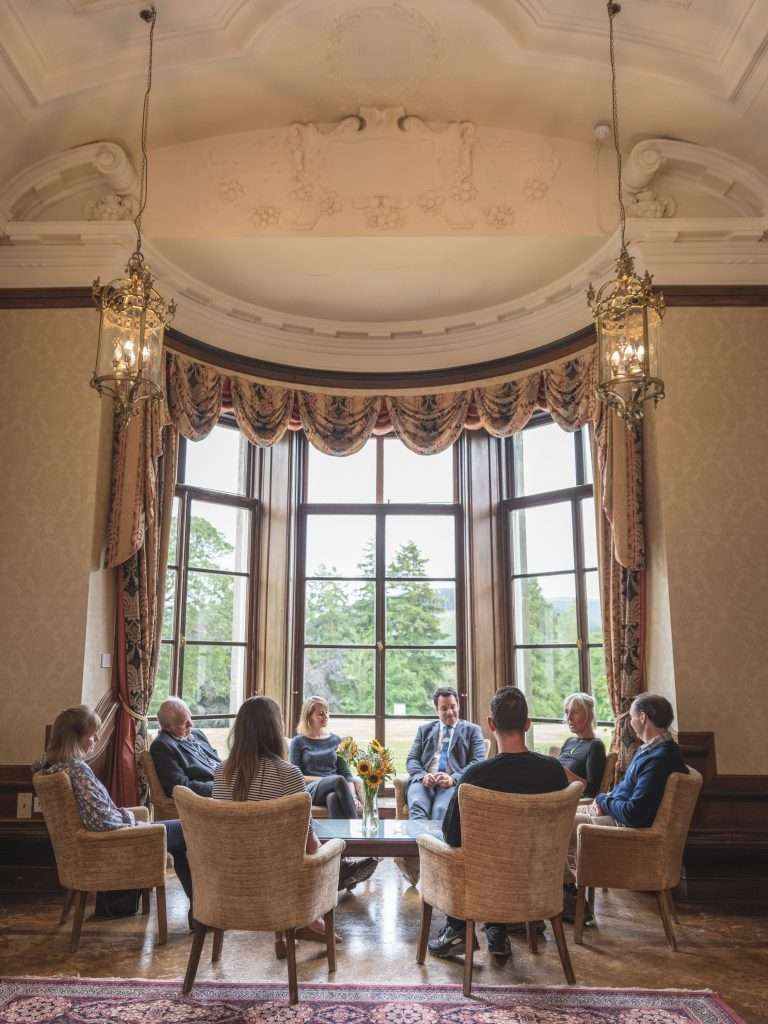
Drug Rehab
Castle Craig has been helping individuals with substance use disorders since 1988, making it one of the UK’s most trusted residential drug rehab clinics. Located in the peaceful Scottish countryside, we provide evidence-based treatments, including medically supervised detox programs and holistic recovery plans. With decades of experience, our clinic offers a safe and supportive space for people to step away from the challenges of daily life, reconnect with nature, and focus entirely on overcoming addiction.
If you’re seeking recovery from drug addiction, our caring team is here to help. Call us on 01721 546 263 to learn more about our personalized treatment plans tailored to your needs. You can also explore further to discover how our programs support long-term recovery and a healthier, substance-free future.
What is Drug Addiction?
Addiction can be defined as when a person is unable to control what they are doing, taking or using, even when it is causing harm to themselves or those around them. 1
With drug addiction, a person becomes compelled to keep taking substances in order to feel good and avoid unpleasant withdrawal symptoms.
Signs of drug addiction include:
- Cravings: an intense urge to keep taking the substance.
- Not being able to stop: repeated unsuccessful attempts to reduce or control drug use.
- Increased tolerance: needing to take more and more of a substance to achieve the same feelings.
- Withdrawal symptoms: experiencing unpleasant symptoms such as sweating, sleep problems, and stomach cramps after stopping the drug.
- Preoccupation: thinking about and planning the next opportunity to use the substance, and losing interest in other activities and social events.
Drug addiction is a chronic disease characterised by compulsive drug use, despite the significant negative consequences of doing so.
Addiction can make us feel isolated and hopeless, but please know that you’re not alone. With the right support, you can recover. And if you’re worried about a loved one’s drug use, we understand how stressful that can be. We can help – you don’t need to tackle this by yourself.

Start Your Drug Addiction Recovery Today
What is a Drug Rehab Centre?
A drug rehab centre is a healthcare facility that treats people struggling with drug addiction, usually with a goal of detoxification and ongoing abstinence. It offers a confidential rehab setting where you can focus on recovery from drug addiction with expert support, away from everyday distractions or potential triggers. Drug rehab programmes are carefully arranged to meet your personal needs.
Do I Need Drug Rehab?
If you are considering drug rehab, then it could be that you or someone you care about has been struggling with drugs for some time. Perhaps you have already tried on your own to reduce or stop taking drugs, but you haven’t yet managed to succeed in stopping. We know how difficult it can be to accept that we have an addiction, and that it might be time to seek professional help.
At Castle Craig, we can provide you with the help that you need. We recognise that every person’s drug addiction is a unique experience, and so we tailor our addiction treatment for each individual patient. Working closely with our highly skilled team, you will be able to address your drug addiction as well as any underlying factors that may have been contributing to it.
Drug Rehab Options to Consider for Long-Term Recovery
Completing drug addiction rehab is a remarkable achievement, but some individuals may face challenges with relapse without consistent support. Choosing an addiction recovery programme that focuses on long-term, sustainable recovery is essential. With the right approach, you can build resilience and develop the skills required to maintain a healthy, substance-free life.
-
Drug Detox and Inpatient Rehab
Detoxification is a critical first step in addressing the physical side of drug addiction. It allows your body to safely adjust to the absence of substances under professional medical supervision, helping to minimise withdrawal symptoms. However, drug detox alone is not enough for recovery. Moving into inpatient rehab provides a distraction-free environment where you can fully concentrate on your healing process.
During inpatient rehab, various therapies are used to address substance misuse issues and provide tailored support for substance use disorder. Personalised counselling, group therapy, and cognitive-behavioural strategies focus on equipping you with mental and emotional strength, enabling you to better understand and tackle the root causes of addiction.
-
Long-Term Drug Addiction Treatment
Drug addiction treatment programmes at residential rehab facilities often begin with a 28-day stay, but extended options such as 30-day, 60-day, or 90-day rehabilitations are available for individuals who need more time and support. These longer-term substance addiction programmes create a structured and immersive environment, encouraging deeper exploration of the underlying causes of substance misuse.
Opting for a long-term rehab programme offers a significant advantage in building resilience and reducing the risk of relapse. With extended care, you have more opportunities to strengthen coping mechanisms, address challenges, and lay the groundwork for a sustainable, healthier lifestyle.
-
Private Residential Drug Rehab
Private residential rehab facilities offer unique benefits, especially if you are seeking timely and personalised care. These private drug addiction treatment facilities usually have no waiting lists, allowing you to access the support you need without delay. Private rehabs also create tailored recovery plans, considering your individual challenges and goals to ensure the best foundation for success.
Many private rehab centres go the extra mile by providing extended care services, such as ongoing therapy and aftercare programmes. These continuing care services ensure you feel supported after completing the initial treatment phase, giving you the confidence and stability needed to maintain your recovery and rebuild your life.


How Do I Know if I Need Drug Addiction Treatment?
If you identify with any of the following, talk to your doctor or give our admissions team a call to discuss:
- You have intense drug cravings or drug withdrawal symptoms.
- Your friends or family members have told you they are concerned about your drug use.
- Your relationships, health, career, and finances are starting to be negatively impacted by the amount of time you spend taking drugs, or the after-effects of drug misuse.
- The amount of time you spend thinking about buying drugs, or recovering from drug use, is increasing.
- You feel anxious and irritable when you can’t get access to drugs.
- You haven’t been able to cut down on your drug use by yourself.
At Castle Craig, our drug addiction treatment clinic allows you time away from your normal routine so that you can focus on your recovery without being challenged by usual triggers. For patients who require careful monitoring while they stop using drugs, we are able to provide medically assisted residential detox so that you can be supported by specialist health professionals as you withdraw.
Free Drug Addiction Assessment
Taking the first step and asking for help can feel daunting, but our team is here to assist you.
What Are The Benefits of Drug Rehabilitation?
Spending time away from home in a residential rehab centre allows you to fully immerse yourself in treatment without other distractions. Drug addiction may have caused chaos in your daily life and relationships, and spending some time in residential treatment allows you to reflect and consider your situation.
After a period of inpatient addiction treatment, our patients often talk about:
-
Better Mental Health
Many people in addiction treatment have other mental health issues such as anxiety, depression and unresolved trauma. Others may be living with the symptoms of ADHD or autism.
At Castle Craig, we can address these other issues alongside your addiction using dual diagnosis. You will be treated by professionals who understand the interconnection between mental health and addiction, and who are specialists in areas such as trauma, eating disorders and problem gambling.
-
Improved Physical Health
Substance misuse has a huge impact on the body, increasing the chances of developing physical complications, such as heart disease, liver cirrhosis or pancreatitis. Inpatient addiction treatment gives you access to medical professionals who can carry out physical health assessments to identify areas of risk.
-
Rebuilding Family Relationships
Drug addiction affects the whole family, not just the individual with the dependency. Rehab treatment programmes enable family members to talk about how they have been impacted by the addiction, and to start rebuilding trust through family therapy sessions.
-
Long-Term Goal Setting
Many people with substance use disorders experience career problems and financial difficulties as a result of their addiction. Drug and alcohol rehab gives you the chance to reset your ambitions, and reassess what you want to achieve in life. A key part of your recovery will involve learning to recognise and manage the triggers for your drug misuse. 2
At Castle Craig, our private treatment centre is set among beautiful hills and woodland, giving patients the opportunity to recover and find new ways of living without drugs.
Ongoing Care After Treatment
To maintain recovery, good quality aftercare is essential. Patients are most at risk of relapse soon after leaving treatment, and so we put access to a detailed continuing care plan in place. All of our patients are invited to join our Recovery Club, and can attend a free weekly online support group for 12 months. Ongoing support is vital, particularly in the early stages of recovery.
More comprehensive aftercare, including further therapy sessions and recovery coaching, can be provided by CATCH Recovery, our specialist outpatient treatment provider.

How Long Does Drug Rehab Take?
This is difficult to answer as treatment outcomes vary so much according to individual factors. These include the length of time you have been struggling with the drug addiction, whether you’ve made previous attempts to recover, and if you have any other mental health conditions to address.
Some residential facilities for drug addiction treatment offer a short course of rehab, but for optimal results we recommend at least a 5 week stay to allow time for assessments and drug detoxification, followed by four weeks of our evidence-based substance use treatment programme.
Many people choose to stay for longer, particularly if their drug withdrawal symptoms are complicated or if they need to address other mental health issues as well as the addiction. Remaining in treatment for a sufficient period of time is vital, with research showing that recovery outcomes are better with longer durations of addiction treatment. 3

What Happens in Drug Rehab?
In a drug rehab centre you will live onsite at a treatment facility for 4-12 weeks to focus on your recovery from drug addiction. During this time patients receive structured, expert treatment to target the drug addiction. This treatment can include drug detoxification, psychotherapies and holistic therapies.
Drug Rehab at Castle Craig
Residential rehab at Castle Craig is very structured and offers the highest available level of professional support.
During your stay you can expect:
- Medical detox from all drugs
- Assessments from the clinical team and therapists
- A customised treatment plan
- Individual addiction counselling therapy twice a week
- 12 Step group therapy, cognitive behavioural therapy, specialist groups and workshops
- Holistic therapies, fitness activities and nature walks
- Family therapy sessions
- EMDR to treat post-traumatic stress disorder
- Education and advice about relapse prevention
For self-funding patients, we offer a continuing care lasting 6 months to support you after you leave our facility. This programme provides group and individual therapy to strengthen your relapse prevention skills and coping skills.

Download Our Brochure
Is My Addiction Severe Enough for Inpatient Treatment?
Residential rehab is available for anyone who feels that drugs are controlling their life. There isn’t a single ‘type’ of addiction that benefits from drug treatment; it depends on your individual needs. At Castle Craig, not everyone requires a medical detox – for instance, if you’re struggling with cocaine or cannabis addiction, you might only need a brief stay in the drug detox facility.
Detox is just the first part of the rehab journey – the rest of the programme has a therapeutic focus to help you develop the tools you need to stay abstinent after you leave. Addiction therapy involves a deep exploration of your mental health, any underlying trauma, and your relationships with family and friends. Once you leave treatment, good quality aftercare is essential to maintain long-term recovery. 4
How Do I Pay for a Drug Rehab?
-
Self-funding
Self-funding patients can usually access private residential rehab in as little as 24 hours.
-
Health Insurance
Castle Craig accepts many major private health insurance companies, including Aetna, Aviva, Bupa, Vitality and many others. Call your provider today, and once your treatment has been authorised at our drug rehab, we can assist you with our insurance admissions steps to ensure a smoother process.
-
NHS Funding
NHS rehab services are free, and your GP or social worker can refer you to a local drug and alcohol team for assessment, often for outpatient treatment. NHS services can be a lifeline for those unable to afford inpatient treatment, but waiting lists can be problematic.
-
Charity Funding
Some drug rehabs operate as charities. These non-profit organisations might be donation-based, or funded by social businesses, which sometimes employ people who have been through treatment themselves.
-
Free Support Groups
Non-profit support groups such as Narcotics Anonymous can be found in all cities and towns. NA meetings are open to anyone seeking abstinence from addiction, regardless of the type of substance used. The only requirement for membership is a desire to stop using drugs, and meetings are free and confidential. In their own words: “If you have a problem with drugs, we are recovering drug addicts who can help you get and stay clean.”
How to Choose a Drug Rehab Facility
Each person in drug addiction recovery has a different background, personality and set of circumstances. Look for a rehab programme that feels compatible with your personal values and recovery goals. Find out what you can about the treatment provider – there may be reports and testimonials from previous patients which can give you a good idea about whether it is the right place for you.
Beware of unethical referrals
Some drug rehabs pay doctors, therapists and other referrers a substantial commission, based on a percentage of your treatment cost. In some cases, seemingly independent addiction websites that appear in internet search results are in fact owned by private rehabs. To protect yourself from this practice of “patient brokering”:
- Be cautious of free hotlines and helplines with no obvious connection to one clinic.
- Be cautious of websites with generic URLs.
- Ask referrers if they receive any benefits in exchange for recommending you.
- Request an itemised quote, and feel free to question any costs that are unclear.
Drug and Substance Addiction Rehab Related Guides
Alcohol Rehab | Drug Rehab | Adderall | Amphetamine | Ativan (Lorazepam) | Benzodiazepines | Buprenorphine | Cannabis | Clonazepam | Cocaine | Codeine | Crystal Meth | Ecstasy (MDMA) | Fentanyl | Heroin | Hydrocodone | Ketamine | Kratom | Morphine | Opioids | Oxycodone | OxyContin | Percocet | Tramadol | Valium | Xanax

Our Approach to Successful Drug Rehab
For over 35 years, Castle Craig has been trusted by thousands of people with their care and confidentiality, and we constantly strive for innovation and excellence in what we do. Our ethos and approach to care is based on compassion, respect and a commitment to person-centred, evidence-based treatment. At Castle Craig we offer you an empathetic space in beautiful surroundings, where you can feel at ease discussing your problems around addiction and mental health. Our experienced therapists ensure that you feel understood, respected and valued as you work towards recovery.
Drug Rehab Regulators
In the UK, the Care Quality Commission (CQC) regulates drug rehab treatment centres in England and Health Improvement Scotland (HIS) regulates drug rehab treatment clinics in Scotland. The CQC conducts inspections and publishes their resulting reports. They also offer resources to help you choose a care provider – all of which is available on their website.
More Questions About Drug Rehab
-
What Types of Drugs Does Rehab Treat?
Rehab is available for any type of substance use disorder be it legal or illegal drugs: cocaine, cannabis, heroin, opioids, benzodiazepines, ketamine, crack cocaine, prescription drugs or stimulants. During your admission assessment you will be asked about your substance misuse history, the length of drug use and frequency. It is important to be open and honest about the drugs you use so that the medical team are informed and can plan your detox safely.
-
What is the Difference Between Inpatient and Outpatient Drug Rehab?
The main difference between inpatient and outpatient drug rehab is the level of care and setting. Inpatient rehab means you live for a short time at the treatment facility and receive 24/7 medical supervision and structured therapy.
Outpatient rehab, on the other hand, allows you to live at home and maintain your daily routines while attending treatment sessions. It is less intensive and more flexible, making it ideal for people with milder addictions or those who have completed inpatient drug or alcohol addiction rehab and need continued support. However, it requires a strong support system and the ability to manage external triggers.
-
What Happens in Drug Rehab?
The road to recovery varies from person to person, but the stages of drug rehab generally involve detox (as needed), primary treatment and continuing care. After rehab, sobriety is maintained via group meetings, drug addiction therapy and other recovery support.
-
Can Family Visit Me in Drug Rehab?
At Castle Craig we permit family members to visit at weekends and for family therapy sessions. The weekend visits take place on a Sunday and we run family workshops and Al-Anon Groups at the same time, so family members can fully benefit from their visit.
-
How Do You Get Someone into Drug Rehab?Drug addiction is condition characterised by denial – often the sufferer won’t recognise that their drug misuse and behaviour is affecting those around them. This means that while family and friends can see their loved one needs help, it can be hard for someone to come to terms with the fact that they need rehab. You can’t force someone to go to rehab against their will, but you can use persuasive methods such as intervention to help them realise that their drug misuse is damaging their lives and they need to stop.
-
How Much Does Drug Rehab Cost?
The cost of private drug rehab depends on the treatment route you choose and the level of care you receive.
Treatment costs include the type of bedroom option e.g. private ensuite room, or shared bedroom. Some treatment centres charge for extras. Costs may vary depending on whether you have private healthcare insurance, are funded by the NHS, or are paying privately.
For more information about costs of treatment at Castle Craig, call our on 01721 546 263 team who can give you more detailed information about pricing and funding.
References
-
References
1 NHS. Addiction: what is it? [Accessed October 2024].
2 With You. Triggers: How to Manage and Avoid Them. [Accessed October 2024].
3 National Institute on Drug Abuse. Principles of drug addiction treatment: A research-based guide. [Accessed October 2024].
4 McKay J. Impact of Continuing Care on Recovery From Substance Use Disorder. Alcohol Res. 2021;41(1): 01.
Confidential Drug Addiction Assessment
Compassionate, expertly delivered evidence-based practices and a patient-centred approach are at the heart of our treatment model. Request a call-back from one of our professionals on any day of the week.